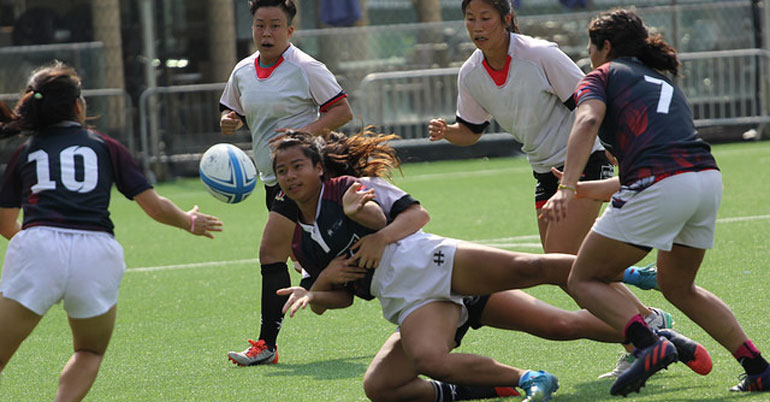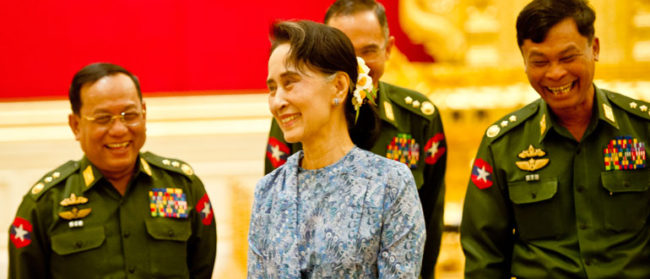The coach creates a grid on the rugby pitch and labels each section: one is designated “male”, a second “female” and a third for “both”.
Players line up and begin passing the rugby ball amongst themselves, racing to their coach who holds a stack of cards in her hands. When the coach reads off of each card, the players scatter and run instinctively toward a specific labeled section of the field.

The coach announces terms like “strong” and “shy” alongside more specific phrases, including “can produce breast milk” and “develops chest hair”. As players choose which section of the field to run toward, they make a decision about whether or not they believe the announced traits belong to a singular gender or whether they apply to both.
“The purpose of the game is to understand there are differences between sex and gender,” explained Stephanie Kim, a technical officer at the Lao Rugby Federation (LRF). “It’s how the coach begins the discussion, [who] then can ask questions that help change perceptions and break boundaries.”
This is a typical drill implemented by the Lao Rugby Federation’s (LRF) rugby programme, established in 2001 under the Laos Ministry of Education and Sport, which offers regular community and school training sessions in the sport. Through its Champa Ban Youth Rugby Project, the LRF operates in dozens of schools and youth groups in Vientiane Capital, Vientiane Province, and Xieng Khouang Province, running a curriculum that uses rugby to teach important lessons regarding gender equity, leadership and financial planning.
Though the rugby federation has been around for nearly two decades, the LRF found new direction and outlets for growth through its 2015 partnership with the ChildFund Pass It Back project, an Australian-funded regional sport development programme. The programme had approximately 300 registered players across Laos in 2015 and now has more than 3,000 with plans to expand and nearly double its number of registered teams in the upcoming year.
When you hear about Laos being a leader, that’s quite unusual – but it is, and we’ve seen huge amounts of change and growth within our rugby project in the past three years
Stephanie Kim
“Since working with ChildFund Pass It Back, Laos has become one of the strongest promoters of using rugby to implement a life-skills curriculum that builds future leaders,” said Kim.
Even as it expands, the federation continues to face its share of challenges. It can be difficult to find safe fields for the teams to play on because of the constant fear of unexploded ordnance in the countryside. Local players and coaches also tend to quit the game because they feel pressure from their families to work or marry at young ages.

“We want to address the issue [of early marriage] by offering more opportunities for young people to be more confident in themselves. So, for example, we pay our coaches a monthly stipend,” Kim explained. “In some cases, their parents are supportive of them continuing to work for pay instead of telling them they have no other option than to get married.”
While a large percentage of the federation’s coach trainers used to be foreign, the LRF has made has made a strong push for locals to take on head coaching and training roles. Now, most LRF coaches are locals between 16 and 24 years old – and, unlike in other rugby leagues, there are about as many females as male coaches.
Annabel Cater, coordinator for LRF sponsorship and outreach, explained that the “rugby for all” slogan adopted by the LRF has seen the programme place a stronger focus on gender equity than at other federations in the region and the world. While the international rugby stage is predominantly male, she said that in Laos, the game is being played by a higher percentage of women than in most Western countries.
We try make sure we have an equal amount of female and male teams and coaches, and we really want to push this concept across the entire federation
Annabel Cater,
“Rugby is still a fairly new sport in Laos, so when we started playing, there were no ideas or preconceived notions about who could play it,” said Cater. “So women have started playing, and in some villages in Laos, people think of rugby as a predominantly female sport. Our players are sometimes surprised when other regions don’t have as many female players.”
The LRF rugby programme has had a positive impact on the country in great part because of the very nature of the sport, which builds great camaraderie, said Cater: “It’s a sport based on respect and trust because you’re literally putting your body on the line for your team. It’s a confidence-building sport that teaches accountability and leadership, and these are skills we want to pass on to every single youth in this country – boys and girls alike.”


